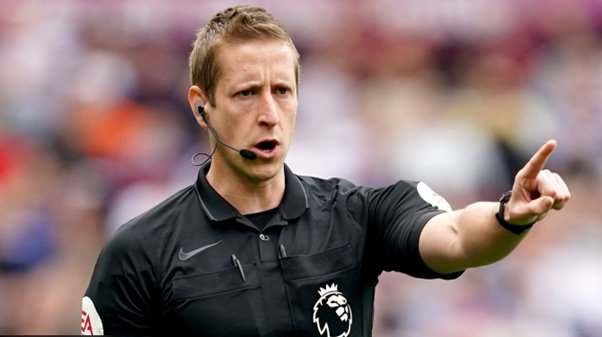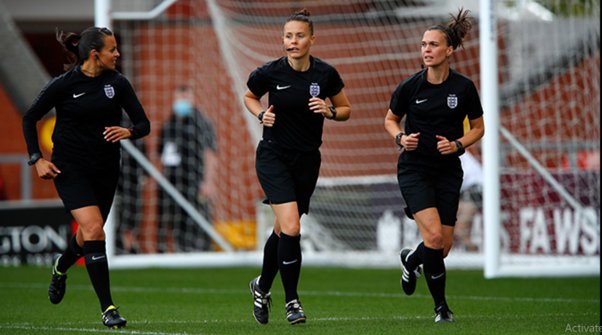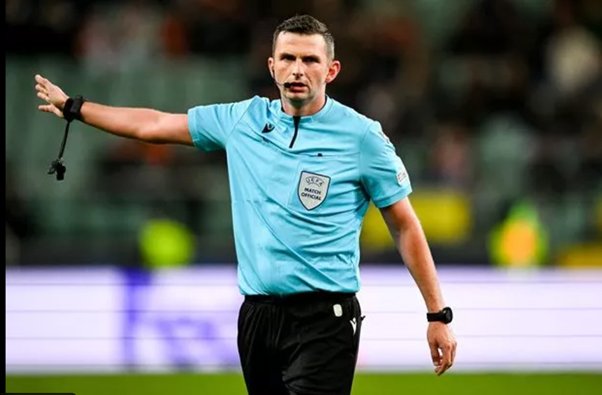
Inside the World of Football Referees in England
01. Written Story

In English football, everyone remembers the goals, the tackles, the drama. But few stop to appreciate the third team on the pitch — the referees. These whistle-blowers shoulder an immense responsibility, often caught between hostile managers, critical fans, and a camera that misses nothing.
Premier League referees are expected to be flawless under extreme pressure, yet rarely receive credit when things go right. In fact, every decision they make is dissected by millions on TV and social media. That pressure has only intensified in the digital age. Take the case of David Coote, a top-flight referee who was suspended in 2024 after a video emerged allegedly showing him insulting Liverpool and former manager Jürgen Klopp (Kearns, 2024). The fallout from the clip, which went viral, serves as a reminder: referees now live in a world where a single offhand remark can derail a career.
In April 2024, Rebecca Welch shattered one of football’s remaining glass ceilings when she became the first woman to referee a Premier League match. But Welch’s journey wasn’t about headlines — it was about earning respect.
“I was asked, ‘Do you get treated differently from the male referees because I’m a female referee?’ I would say it works in my favour, especially in the male game,” Welch told The Times (2024). “If being a female in a men’s game could work in my favour, then I was going to take it every day of the week.”
She went on to explain that male players often showed her more restraint than they did her male colleagues. “I’ve been fourth official and the players keep going and going [at male officials], but with me I never found that. I don’t know if that’s because I’m 5ft 4in.”
Welch, who retired in August 2024 after officiating over 50 EFL and Premier League games, said her goal was simple: “I want people to forget about Rebecca Welch. If we get to that space and it just becomes the norm, then for me that’s my job done.”


Away from the glitz of the Premier League, referees in youth and amateur leagues fight their own battles. According to research by Andersson (2019), grassroots officials — many of them teenagers — are frequently exposed to verbal abuse from parents, coaches, and even players.
The Football Association (FA) has tried to stem the tide. Its latest report shows a referee retention rate of 77.8% for the 2023–24 season (FA, 2024), reflecting improvements in training, mentorship, and referee protection policies.
But challenges persist. Many grassroots referees quit within their first year due to abuse. The FA’s strategy now includes education programmes aimed at players, parents, and coaches to rebuild respect for match officials.
When Video Assistant Referee (VAR) technology was introduced in English football, it promised clarity. But instead, it has stirred confusion and controversy.
At a Carabao Cup semi-final in January 2024, referee Stuart Attwell made history by becoming the first English official to announce a VAR decision via the stadium’s PA system:
“After a review, Dominic Solanke was in an offside position in the buildup to the goal, therefore the decision is offside.”
The move was welcomed as a step toward transparency, but it didn’t silence critics. Spurs manager Ange Postecoglou expressed unease with the whole concept:
“Did everyone really love the announcement today? Did that give you a little buzz? … Why isn’t anyone speaking up about it? Especially in this country.” (The Times, 2024)
Technology may be improving the accuracy of decisions, but it has also shifted the pressure onto referees in new ways. Split-second calls are now replayed in slow motion, judged not just on outcomes but optics.

Referees don’t simply show up and officiate. The road from Sunday league to the Premier League is paved with assessments, fitness tests, and psychological preparation.
The FA’s development pathways focus on integrity, consistency, and communication. And increasingly, they’re placing emphasis on diversity too. The aim is to build a referee workforce that reflects the communities they serve — women, ethnic minorities, and officials with disabilities included.
For many, refereeing isn’t just a side hustle. It’s a career — and a calling. From Sunny Gill Singh, one of the few South Asian referees in the professional game, to Welch and Attwell, each official represents a different facet of football’s evolving culture.
Referees are rarely cheered. They don’t score goals or lift trophies. But they are the silent architects of the sport — ensuring that fairness, discipline, and order prevail in a game ruled by passion.
Perhaps Rebecca Welch said it best:
“If people forget about Rebecca Welch, and just see me as a referee — not a female referee — then I’ve done my job.”
